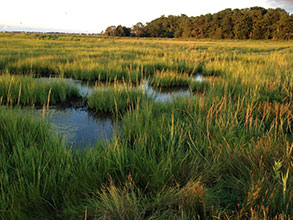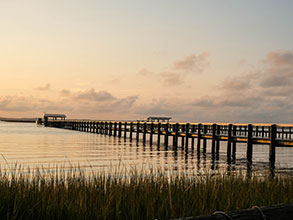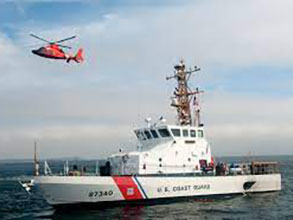NCCOS Cooperative Oxford Laboratory
The Cooperative Oxford Laboratory (COL) is a partnership between NOAA, the Maryland Department of Natural Resources and the USCG Station Oxford. COL partners combine science, response, and management capabilities to meet respective missions and collaborate to address science and management challenges. The lab is a branch of NCCOS’ Marine Spatial Ecology Division. NOAA and MD DNR scientific capabilities are diverse and include expertise in field ecology, advanced underwater acoustic technologies, histopathology, fish health, marine mammal and sea turtle stranding response, ecological assessments, ecological forecasting, quantifying ecosystem services, research to enhance preparedness and recovery in the face of coastal change, and research of novel methods to improve restoration and resilience practices.
Areas of Focus
Pathogen Forecasting at Oxford
Since 2005, NCCOS’ Oxford Lab has worked with federal, state, and academic partners to forecast where and when pathogens are most likely to be found in the Chesapeake Bay, based on the salinity and temperature of the water. When pathogens are present, cooking shellfish and washing open wounds after contact with coastal waters will decrease the risk of infection and illness. Public health officials use our forecasts to target public safety messages and monitoring.
About the Cooperative Oxford Laboratory
The laboratory, centrally located in Chesapeake Bay on the Tred Avon River, was established in 1960 primarily to investigate oyster diseases that devastated the fishery in the late 1950s. The facility became the Cooperative Oxford Laboratory in 1987 through an agreement between NOAA and the Maryland Department of Natural Resources to share the facility and cooperate in research.
Oyster Restoration Reef and Monitoring Station
Within the first designated oyster sanctuary in Maryland, COL provides near real-time water quality data
and video streaming of a demonstration oyster restoration reef. These tools allow viewers to see a
microcosm of large-scale ongoing oyster restoration in Chesapeake Bay in a way that is personal, visual,
and impactful. Researchers can use the tools to quantitatively evaluate numerous research objectives.
Our oyster sanctuary is currently undergoing modifications and will be in operation soon.
Find our more about our oyster research below.
Our Partnerships
Featured Stories




